|
|
|
Sort Order |
|
|
|
Items / Page
|
|
|
|
|
|
|
| Srl | Item |
| 1 |
ID:
111157


|
|
|
|
|
| Publication |
2012.
|
| Summary/Abstract |
The conflict in Afghanistan is arguably now ripe for a negotiated peace. The reintegration and demobilisation of insurgents has been attempted in Afghanistan before, with limited success. However, the current Afghanistan Peace and Reintegration Program (APRP) commands a lot of political will and is much more holistic in its approach to long-term stability than previous programs have been. Afghans on the whole approve of the idea of reintegration and reconciliation, but do not necessarily believe it can be achieved. Their fears are well founded, but the failure of the APRP is not inevitable.
|
|
|
|
|
|
|
|
|
|
|
|
|
|
|
|
| 2 |
ID:
181047
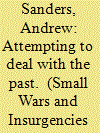

|
|
|
|
|
| Summary/Abstract |
Over the summer of 2019 a number of maroon banners appeared across towns and cities in Northern Ireland, declaring that the local population ‘stands with Soldier F’. Soldier F was a member of the Parachute Regiment who, in March of 2019, was charged with the murders of James Wray and William McKinney and five additional attempted murders as a result of his actions on Bloody Sunday, 30 January 1972. These charges were announced at a time when it was reported that up to 200 former members of the British Army could face official investigation for their conduct in Northern Ireland. These cases sit at the centre of the sensitive and divisive issue of the legacy dimension of the Northern Ireland conflict, posing a challenge to the continuing success of the Northern Ireland peace process. Engaging a developing literature on post conflict reconciliation processes, this article will analyse the issue of legacy prosecutions from Operation Banner.
|
|
|
|
|
|
|
|
|
|
|
|
|
|
|
|
| 3 |
ID:
080459
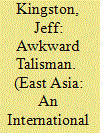

|
|
|
|
|
| Publication |
2007.
|
| Summary/Abstract |
Yasukuni Shrine resonates with talismanic symbolism for both its critics and proponents and that is precisely why it is so controversial within Japan and between Japan and its neighbors. Controversy over Yasukuni is rooted in the broader historical debate about war memory, responsibility, and reconciliation. Competing narratives about this past send mixed signals to neighbors and prevent reconciliation. Despite Prime Minister Koizumi's six visits, Yasukuni is an awkward talisman and many Japanese, including conservatives, oppose these visits. The Shrine's image has been cast and no amount of artful repackaging will obscure its indelible links with Japan's discredited Imperial ideology and the costs it exacted. The Yasukuni dilemma involves shifting the focal point of official war remembrance away from the Shrine to a secular war memorial where people and officials can pay respect to the war dead free from political agendas and historical baggage
|
|
|
|
|
|
|
|
|
|
|
|
|
|
|
|
| 4 |
ID:
073641
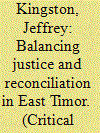

|
|
|
|
|
| Publication |
2006.
|
| Summary/Abstract |
As East Timor emerges from a long Indonesian nightmare, it is seeking to balance the agendas of justice and reconciliation. The verdict on justice for East Timor is one of disappointment. The main obstacle to accountability is Indonesia, abetted by an international community that seeks its assistance in the "war on terror." East Timor's leaders have emphasized reconciliation while promoting a healing process and good governance. Recent violence reveals just how difficult this task remains. The hybrid tribunal established in East Timor by the UN was once heralded as an important innovation in transitional justice, avoiding the high cost and lengthy proceedings of other international tribunals. However, the tribunal has been unable to hold accountable those who bear the greatest responsibility for outrages committed against Timorese and defendants did not get fair trials or competent defense. A truth commission report released in December 2005, Chega! (Enough), emphasizes justice and reparations. The political leadership soft peddles justice because they believe this makes more sense and will better serve the people. Indonesians are now being given a chance to testify in front of the Commission of Truth and Friendship (CTF), but concern is widespread concern that the CTF emphasizes reaching closure, has no judicial mandate, and only ensures impunity for ranking perpetrators. Indonesia and East Timorese can regain dignity and move beyond their shared tragedy through a process of reconciliation that is based on justice and atonement. Germany shows this is possible; Japan, that it is difficult and problematic if neglected.
|
|
|
|
|
|
|
|
|
|
|
|
|
|
|
|
| 5 |
ID:
190861


|
|
|
|
|
| Summary/Abstract |
Ex-combatants, war victims, and violence-affected community members are typically forced to live together as neighbors in post-conflict settings. Cases all over the world accumulate evidence on the fact that living together after war is a far from a harmonic endeavor, and individuals usually rely on contention mechanisms to keep on with their daily lives while in proximity of former and present-day antagonists. While decades-long academic research has unveiled a series of favorable conditions under which interactions might generate positive effects on intergroup dispositions, they usually prescribe focusing less on touching upon divisive issues, and more on emphasizing in potentially bonding commonalities. By means of a randomized controlled experiment with former war antagonists in Colombia, we set to explore whether avoidance or addressing of the most sensitive issues affecting intergroup relations yield better results in terms of attitude change under favorable conditions. Experimental effects show that perspective-giving protocols are capable of containing polarization tendencies in intergroup discussions even when participants are incentivized to directly address their co-existence problems, while qualitative analysis points out at silences and other avoidance mechanisms as the participants’ key strategies to contain conflict when contentious topics flare up during discussions.
|
|
|
|
|
|
|
|
|
|
|
|
|
|
|
|
| 6 |
ID:
160615
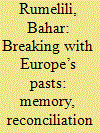

|
|
|
|
|
| Summary/Abstract |
The European Union is widely credited for consolidating a democratic “security community” in Europe, and bringing about a definitive break with war-torn and authoritarian/totalitarian pasts in many European countries. Drawing on recent discussions in ontological security studies, this article points out that these radical breaks may have come at the expense of ontological insecurity at the societal and individual levels in Europe. While conventional teleological narratives often treat reconciliation and breaking with the past as automatic by-products of European integration, ontological security theory calls for greater attention to the societal tensions and anxieties triggered by these transformations and how they are being managed –more or less successfully – through reconciliation dynamics and memory politics in different societal settings. Illustrating the variation in a number of cases, this article claims that a systematic comparative analysis of the different dynamics of reconciliation and memory politics in different European societies is central to analyzing European integration from an ontological security perspective.
|
|
|
|
|
|
|
|
|
|
|
|
|
|
|
|
| 7 |
ID:
153237
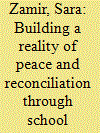

|
|
|
|
|
| Summary/Abstract |
This article shows that effective reconciliation and peace-building require teaching children a constructed narrative based on the opposing stories, especially with regard to an intractable conflict such as the one that characterizes the Israeli–Palestinian case. Textbooks play an important role in any country when it comes to creating collective memory and political consciousness. They change over time, according to political and social powers within that nation, and can support and inspire processes of war or peace education. In a transition period between war and peace, for example, one can distinguish differential trends of texts that convey acceptance, tolerance, minimization of stereotypes and reduction of war imagery compared to the preceding period – all in the service of building a reality of peace and reconciliation.
|
|
|
|
|
|
|
|
|
|
|
|
|
|
|
|
| 8 |
ID:
132382
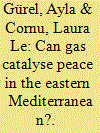

|
|
|
|
|
| Publication |
2014.
|
| Summary/Abstract |
The economic rationale for energy collaboration between Turkey, Cyprus and Israel is compelling. Cyprus and Israel need commercially viable export routes for their gas while Turkey is eager to diversify and increase its gas supplies. Hydrocarbon resources could potentially be a catalyst for both bringing about a Cyprus settlement and a Turkey-Israel rapprochement. A trilateral cooperation scheme involving a Turkey-Israel pipeline and an LNG plant in Cyprus could offer strong commercial incentives to all parties. But it would require bold political vision on the part of the region's leaders, coupled with backing from influential external actors with an interest in reconciliation and stability in the Eastern Mediterranean.
|
|
|
|
|
|
|
|
|
|
|
|
|
|
|
|
| 9 |
ID:
134354


|
|
|
|
|
| Summary/Abstract |
This paper employs functionalist, transformative and peacebuilding approaches to explore the role played by civil society in peacebuilding during Zimbabwe's coalition government (2009–2013), under the Church and Civil Society Forum (CCSF). Through the functions of democratisation, socialisation and the rebuilding of communities, the various bottom-up peacebuilding initiatives under the CCSF framework rebuilt broken relationships, provided spaces of encounter between victims and perpetrators, and bridged the paradoxical values of mercy, justice, truth and peace in a context of deep political polarisation. Although the various peacebuilding activities were scattered and sporadic, they do provide a basis for nationwide replication under a ZANU-PF dominated government. The new 2013 constitution provides institutional opportunities for the formulation of a broader national framework for peacebuilding that synergises these efforts by civil society and a politically willing state.
|
|
|
|
|
|
|
|
|
|
|
|
|
|
|
|
| 10 |
ID:
049640
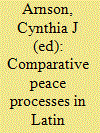

|
|
|
|
|
| Publication |
Washington, D.C., Woodrow Wilson Center Press, 1999.
|
| Description |
xiii, 493p.
|
| Standard Number |
0804735883
|
|
|
|
|
|
|
|
|
|
|
|
Copies: C:1/I:0,R:0,Q:0
Circulation
| Accession# | Call# | Current Location | Status | Policy | Location |
| 043178 | 327.172098/ARN 043178 | Main | On Shelf | General | |
|
|
|
|
| 11 |
ID:
174598
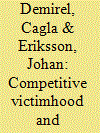

|
|
|
|
|
| Summary/Abstract |
This paper argues that conflicts tend to be intractable if collective victimhood has become a component of national identity, and when conflicting communities claim to be the ‘real’ or ‘only’ victims, and that their suffering justifies crimes past and present. Turkish and Armenian narratives of competitive victimhood are analysed drawing on public opinion polls from Turkey and Armenia, and personal interviews with Turks and Armenians. The study corroborates past theory and research that competitive victimhood prevents reconciliation, particularly if it has become an essential part of national identity. The paper also shows that Turkish–Armenian relations remain at the bottom stage of the reconciliation ladder. Yet, some of our empirical observations suggest that when grass-roots level interaction between Turks and Armenians is facilitated (which has been prevented not least because of the closed border), there is room for the abandonment of competitive victimhood at least on an interpersonal level, if not on a general societal or political level.
|
|
|
|
|
|
|
|
|
|
|
|
|
|
|
|
| 12 |
ID:
079787
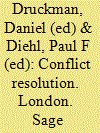

|
|
|
|
|
| Publication |
London, Sage Publications, 2006.
|
| Description |
v1(l, 396p.); v2(vi, 398p.); v3(vi, 391p.); v4(vi, 377p.); v5(vi, 440p.)
|
| Series |
Sage library of international relations
|
| Standard Number |
9781412921879
|
|
|
|
|
|
|
|
|
|
|
|
Copies: C:5/I:0,R:5,Q:0
Circulation
| Accession# | Call# | Current Location | Status | Policy | Location |
| 052845 | 327.17/DRU 052845 | Main | On Shelf | Reference books | |
| 052846 | 327.17/DRU 052846 | Main | On Shelf | Reference books | |
| 052847 | 327.17/DRU 052847 | Main | On Shelf | Reference books | |
| 052848 | 327.17/DRU 052848 | Main | On Shelf | Reference books | |
| 052849 | 327.17/DRU 052849 | Main | On Shelf | Reference books | |
|
|
|
|
| 13 |
ID:
152870


|
|
|
|
|
| Summary/Abstract |
The issue of terrorism has been a significant source of influence on the relationship between Iran and the U.S. since the Islamic Revolution. Iran's friendship with extremist groups that are designated as terrorist groups by the U.S. State Department is seriously challenging America's foreign policy. This article attempts to explore the prospect of confrontations on the issue of terrorism between Iran and the U.S. through a detailed analysis of their different interpretations and mutual recognitions of terrorism and through an in-depth analysis of the measures each party has taken regarding this confrontation. This article argues that the confrontation between Iran and the U.S. regarding the issue of terrorism is not strictly about terrorism. Rather, it is also about the conflicts of policies that result from different security interests and political values. Resolving the issue of terrorism depends on the reconciliation of the relationship between Iran and the U.S. Without mutual trust between the two nations, Iran will continue to support extremist groups in order to increase its influence against the external and internal pressures it is currently under, and the U.S. will continue to contain Iran's regional ambitions and seek changes in its behavior.
|
|
|
|
|
|
|
|
|
|
|
|
|
|
|
|
| 14 |
ID:
153235
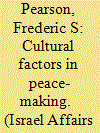

|
|
|
|
|
| Summary/Abstract |
The importance of culture, while recognized, has received proportionately less attention than political and economic issues and objective interests in settling political disputes. Traditional ways of understanding conflict and approaches to reconciliation nevertheless appear to play a major role in the frequent breakdown of peace agreements, as parties’ underlying needs and expectations are not met. A review of data on peace agreements in the Middle East as compared to the rest of the world shows that power imbalance, perceptions of injustice and the authority of potential mediators play especially important roles in success. In cases of inter-Arab and Arab–Israeli conflict, reconciliation requires power rebalance, demonstrated mutual respect and security guarantees.
|
|
|
|
|
|
|
|
|
|
|
|
|
|
|
|
| 15 |
ID:
112413
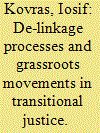

|
|
|
|
|
| Publication |
2012.
|
| Summary/Abstract |
Transitional justice literature has highlighted a negative relationship between enforced disappearances and reconciliation in post-conflict settings. Little attention has been paid to how human rights issues can become stepping-stones to reconciliation. The article explains the transformation of the Cypriot Committee on Missing Persons (CMP) from an inoperative body into a successful humanitarian forum, paving the way for the pro-rapprochement bi-communal grassroots mobilization of the relatives of the missing. By juxtaposing the experience of Cyprus with other societies confronting similar problems, the article shows how the issue of the missing can become a driving force for reconciliation. The findings indicate that a policy delinking humanitarian exhumations from the prospect of a wider political settlement facilitates positive transformation in protracted human rights problems and opens up a window of opportunity to grassroots actors.
|
|
|
|
|
|
|
|
|
|
|
|
|
|
|
|
| 16 |
ID:
152951
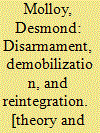

|
|
|
|
|
| Publication |
Colorado, Kumarian Press, 2017.
|
| Description |
vii, 255p.pbk
|
| Standard Number |
9781626375680
|
|
|
|
|
|
|
|
|
|
|
|
Copies: C:1/I:0,R:0,Q:0
Circulation
| Accession# | Call# | Current Location | Status | Policy | Location |
| 059061 | 327.1/MOL 059061 | Main | On Shelf | General | |
|
|
|
|
| 17 |
ID:
092261


|
|
|
|
|
| Publication |
2009.
|
| Summary/Abstract |
How can Japan put its past behind? Scholars, journalists, and activists frequently argue that Japan cannot solve its "history problem" unless it follows West Germany's lead in offering contrition for World War II violence. Into this debate, Jennifer Lind's Sorry States: Apologies in International Politics offers an original and provocative contribution. Lind argues that while countries should acknowledge past atrocities, frequent public apologies can be domestically polarizing and diplomatically counterproductive. Sorry States outlines a theory of remembrance and threat perception and tests it in a comparative study of Japanese-South Korean and Franco-German relations after World War II. Its methods, data, and findings will interest not only East Asianists, but also scholars of international reconciliation and security studies more broadly. This roundtable presents three critical essays in addition to a response by the author. They discuss the mechanisms through which historical memory influences perceptions of threat, the relative weight of ideational versus material factors in threat perception, and whether changes in international norms and economic interdependence may increasingly pressure countries to confront past violence.
|
|
|
|
|
|
|
|
|
|
|
|
|
|
|
|
| 18 |
ID:
187390


|
|
|
|
|
| Summary/Abstract |
Research on postwar peace focuses primarily on how elites and institutions can prevent relapse into civil war. In line with this special issue’s focus on citizens’ experiences, we take a micro-level approach to explore peace beyond the absence of war. We investigate how members of opposing sides experience peace a decade after a decisive victory of the majority. Using original survey data from a representative sample of 2000 respondents in 2018 Sri Lanka, we find that even one decade after the conflict members of the Sinhalese winning majority are consistently more likely to report improvements in peace than Tamils, who were represented by the defeated minority. But the benefit of a “victor’s peace” does not seem to translate into an optimistic outlook of the victorious group, nor does it increase people’s endorsement for repressive state measures. Despite the drastically improved physical security for the defeated ethnic minority since the war, they experience a deterioration in other dimensions of peace. Our findings have important implications for a deeper understanding of variations in peace and reconciliation processes.
|
|
|
|
|
|
|
|
|
|
|
|
|
|
|
|
| 19 |
ID:
153266
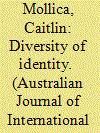

|
|
|
|
|
| Summary/Abstract |
In recent years, the transitional justice field has become increasingly concerned with ensuring meaningful participation from a wide range of actors. In response, a burgeoning scholarship has emerged, which aims to understand the interests and needs of these stakeholders, most notably women and children. Noticeably absent from this research is an examination of youth interests as distinct from children’s. Instead, the conflict identities of youth are most often conceived as inextricably tied to those of children. As a result, the narrow victim/perpetrator binary remains the dominant identity construction employed for understanding their involvement in conflict and transitional justice processes. Drawing on the case of the Solomon Islands Truth and Reconciliation Commission, this article reveals that youth are more than passive subjects in the reconciliation process. It demonstrates that the interactions of youth with truth and reconciliation commission processes allow youth to exercise agency, and thus challenge the dominance of the victim/perpetrator identity construct. The article thus proposes an alternative way of framing youth participation, whereby the identities of youth in transitional contexts are represented as diverse and malleable.
|
|
|
|
|
|
|
|
|
|
|
|
|
|
|
|
| 20 |
ID:
186327
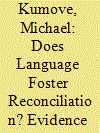

|
|
|
|
|
| Summary/Abstract |
Despite a surge in research on post-conflict reconciliation, the specific factors which promote reconciliation remain a subject of debate. In particular, the possible role of shared language in fostering reconciliation has received little scholarly attention. This paper examines two possible channels through which shared language may facilitate reconciliation, and tests these using a new survey dataset of 446 individuals from Serbia. As expected, the results indicated that shared language reduces the negative effect of conflict on intergroup trust and friendship, two crucial components of reconciliation. Furthermore, the results suggest that in the former Yugoslavia this effect is generated by the communication-enabling aspects of a shared language, rather than its other properties such as acting as a marker of ethnic or cultural identity.
|
|
|
|
|
|
|
|
|
|
|
|
|
|
|
|
|
|
|
|
|